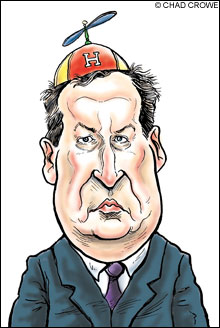 My dear Harvard students, administrators, faculty, and alumni:
My dear Harvard students, administrators, faculty, and alumni:
We find ourselves in what we academics call “a teachable moment.” A struggle is afoot for control of the soul of the academy — at Harvard and every other liberal-arts campus. Unfettered debate and inquiry are under grave assault.
From the outset, my tenure as Harvard’s president has been punctuated by a series of phony crises. Some of these episodes were blamed on my lack of personal sensitivity, others on my misconception of a university president’s role vis-à-vis the faculty. This is deeply troubling to me, not because my social reputation is at stake, but because something larger hangs in the balance: whether or not academic freedom will remain intact. I take seriously the duty bestowed on me, and I welcome robust criticism; reciprocally, I reserve the right, indeed the duty, to voice my unvarnished views about the directions in which I feel Harvard must move.
Let me recount a few of the more highly publicized events of my presidency thus far. It began with my calling into question Harvard’s hostile attitude toward the military in general and the university’s refusal specifically to allow ROTC on campus because of the military’s “don’t ask/don’t tell” policy — a policy that I personally find offensive and counter-productive. In the same speech, delivered as a personal guest sermon in Harvard’s tradition of encouraging members of the community to speak out on moral and ethical issues, I questioned whether calls for the university to disinvest in companies that do business with Israel were engaging in a hypocritical double standard that might be deemed “anti-Semitic in their effect, if not in their intent.” Faculty authoritarians revolted against my right to deliver my speech, yet I stand by what I said.
My spat with Afro-American-studies professor Cornel West — a private conversation leaked to the news media — likewise drew the spirited disapproval of my faculty critics. It was deemed insensitive, if not outright racist, for a university president to inquire whether a scholar should contribute more to the body of knowledge in his stated field than to rap music. Mind you, I like rap music and think it has a place in the cultural canon, yet I stand by what I said.
And then there were my remarks to a September 2004 conference on Native American studies at Harvard, in which I noted that significantly more indigenous people died not from the settlers’ weapons but from their pathogens. For stating this empirical fact, I was lambasted as insensitive to the plight of Native Americans and an apologist for colonialism — a genocide denier. I stand by what I said. Facts, it has been wisely said, are stubborn things.
My welcoming “off-the-record” talk at the National Bureau of Economic Research, in early 2005, drew the greatest criticism. I spoke about the frustrating scarcity of women in academic math, engineering, and science programs, and posited, among other possibilities, that the under-representation might in some measure be the result of innate differences between men and women. I suggested as well other possible obstacles to women’s success in academic science, including the lack of adequate child-care facilities and the dearth of accommodations to interruptions in the tenure track. I conceded as well that gender discrimination doubtless played some role. To my dismay, only my comment on innate gender differences drew audience and faculty attention; indeed, a woman scientist from neighboring MIT complained to a newspaper reporter that she had to leave the room lest she faint or throw up listening to me. The problem of women’s under-representation in science will not be solved by burying our heads in the quicksand of ideologically dictated gender-discrimination theory. With all due regard for the overly sensitive digestive tracts of my critics, I stand by what I said.
This was about more than whether I speculated in an area in which I am not a recognized expert. It was about whether the modern American academy is any longer a safe haven for true diversity of thought and opinion, and whether some subjects are so toxic to a subsection of the academic left that they are taboo. We extol the virtues of diversity in a wide variety of programs — including mandatory freshman orientation and “sensitivity training” programs that come perilously close to being exercises in thought-reform — but we penalize diversity of knowledge and opinion. I was not immune to these forces, as exhibited in my shameful attempt to buy off my critics with a $50 million bribe for a laundry list of senseless initiatives compiled by two women’s task forces that will do little more than further expand an already bloated administrative structure. I hereby declare that initiative dissolved. The un-spent money will go to endow a much-needed and long-overdue chair in academic freedom at Harvard Law School.